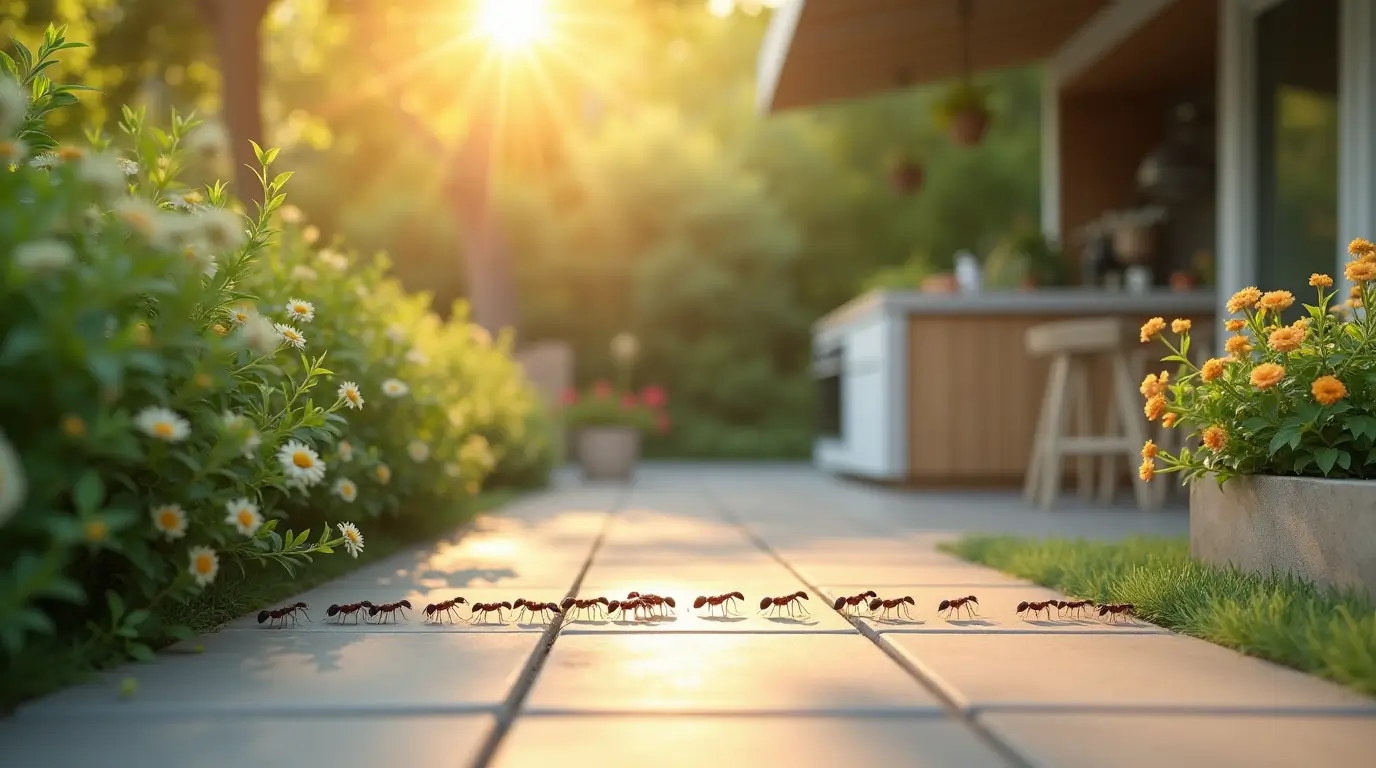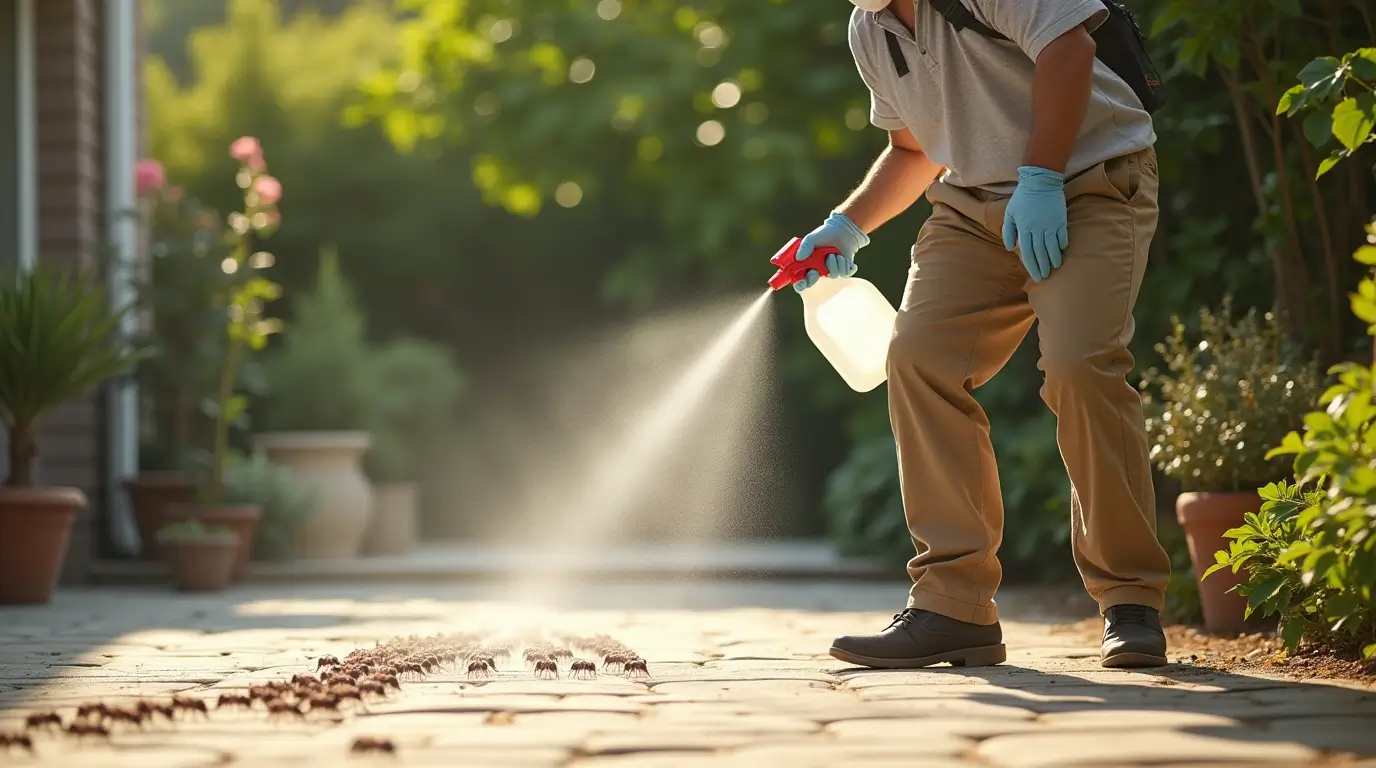Does Bleach Kill Ants? 5 Proven Ways It Works

Introduction
Picture this: you’re enjoying a peaceful afternoon in your garden when suddenly you spot them – tiny invaders marching in a perfect line across your patio or, worse yet, trailing through your kitchen. Ant infestations can turn any garden sanctuary or cozy home into a battlefield overnight. When searching for immediate solutions, you might wonder – does bleach kill ants? The answer is yes, but there’s more to understand about this common household chemical as an ant control method.
Did you know that bleach has been used as a cleaning agent and disinfectant since the 18th century? This powerful household staple not only brightens your whites and sanitizes surfaces but can also be an effective weapon in your battle against ant invasions. While commercial products like TERRO T300B are specifically designed for ant control, bleach offers an alternative that many homeowners already have on hand.
What makes bleach stand out among DIY pest solutions is its immediate availability and dual functionality: it’s both a contact killer for visible ants and a powerful scent eliminator that disrupts their chemical trails. However, unlike specialized Indoor Ant Killer products, bleach requires careful handling and comes with important limitations and safety considerations.
While Ant Bait Stations and professional Pest Control methods might be more targeted long-term solutions, bleach can be an effective emergency intervention when you need immediate results. Ready to learn if and how bleach can help reclaim your home from these tiny invaders? Let’s explore the science behind whether does bleach kill ants and the proper methods for using it safely and effectively.
Table of Contents
How Does Bleach Kill Ants?
You might be wondering, “Does bleach kill ants instantly?” The answer is yes, but understanding how it works helps explain both its effectiveness and limitations. Household bleach contains sodium hypochlorite, a powerful oxidizing agent that breaks down proteins – essentially dissolving the ant’s exoskeleton and internal organs on contact. This same chemical reaction that makes bleach effective at removing stains and killing bacteria makes it lethal to ants and other insects.
When an ant encounters bleach, the chemical immediately begins breaking down the protective outer layer of its body. Think of it as removing a knight’s armor before battle – without this protection, the ant cannot survive. Additionally, bleach’s strong smell completely obliterates the pheromone trails ants leave behind, creating confusion in the colony and preventing more ants from following the same path.
However, while bleach is undeniably effective as a contact killer, it differs from specialized Ant Traps in one crucial way – it doesn’t address the root of your problem: the colony and its queen. For complete elimination, you’ll need to consider whether does bleach kill ants in the nest, not just those visible in your home.
Why Consider Using Bleach for Ant Control:
Immediate Availability
When ants suddenly appear in your kitchen or bathroom, waiting for an Amazon Product to arrive may not be an option. Most households already have bleach on hand for cleaning purposes, making it an immediate intervention tool. This accessibility means you can take action at the first sign of an infestation, potentially preventing a larger problem from developing. While specialized Home Pest Solutions might offer more comprehensive control, bleach provides that crucial stop-gap measure when you need to act quickly.
Cost-Effective Solution
Commercial Household Pesticides designed specifically for ant control can be expensive, especially if you’re dealing with a minor or one-time infestation. A bottle of bleach costs just a few dollars and serves multiple purposes around your home. This multi-functionality makes bleach an economical choice for occasional ant problems. However, it’s important to consider whether does bleach kill ants effectively enough for your specific situation, as severe infestations may ultimately require more specialized treatments.
Dual-Action Effectiveness
Bleach works in two ways to combat ant problems: it kills ants on contact and eliminates their scent trails. This dual action not only addresses the immediate visible problem but also helps prevent new ants from following the same path into your home. The powerful cleaning properties of bleach also remove food residues that might attract ants in the first place, addressing multiple aspects of ant control simultaneously. However, unlike Insect Killer products specifically formulated for long-term control, bleach’s effects are relatively short-lived.
When comparing bleach to commercial ant killers, it’s important to understand that while bleach can be effective for spot treatments and emergency situations, products designed specifically for Effective Ant Control often contain attractants that draw ants to the poison and allow them to carry it back to the colony – something bleach cannot accomplish.
So does bleach kill ants well enough to be your only solution? For small, localized problems, possibly. For more extensive infestations, it’s best used as part of a broader strategy.
How to Safely Use Bleach for Ant Control:
Quick Overview:
Before discussing specific methods for using bleach against ants, it’s crucial to understand proper safety protocols. Bleach is a powerful chemical that can cause respiratory irritation, skin burns, and eye damage if mishandled. Additionally, it can damage certain surfaces, discolor fabrics, and harm plants. Always wear gloves, ensure good ventilation, and never mix bleach with other cleaning products – especially ammonia or vinegar – as this can create dangerous gases. With these precautions in mind, let’s explore how to determine whether does bleach kill ants effectively in your specific situation.
Key Supplies You’ll Need:
To safely utilize bleach for ant control, gather these essential items:
- Regular household bleach (sodium hypochlorite 5-8%)
- Spray bottle
- Protective rubber gloves
- Eye protection
- Water for dilution
- Paper towels or cleaning cloths
Pro Tip: For most ant control applications, diluted bleach is sufficient and safer to use. Full-strength bleach should only be used in extreme situations and never on food preparation surfaces or areas accessible to children and pets.
5 Proven Ways Bleach Works Against Ants:

1. Direct Contact Spray
The most immediate way to answer whether does bleach kill ants is to witness its contact-killing ability.
- Dilute bleach with water in a 1:1 ratio in a spray bottle.
- Spray directly on visible ants.
- Wipe away dead ants and residue with paper towels.
✅ Pro Tip: This method works best for immediate problems rather than long-term control. Unlike TERRO T300B and other baits, it won’t affect the colony unless you directly spray the nest.
2. Trail Elimination Treatment
Disrupting ant trails prevents reinforcements and breaks their communication system.
- Identify ant pathways and trails.
- Create a solution of 1 part bleach to 3 parts water.
- Wipe down the entire trail path, focusing on edges and corners.
- Allow to air dry completely.
✅ Pro Tip: Repeat this treatment daily until ant activity ceases. The effectiveness of whether does bleach kill ants long-term depends largely on consistently eliminating these chemical highways.
3. Entry Point Barrier
Create deterrents at common ant access points to your home.
- Locate cracks, gaps, and openings where ants enter.
- Apply a thin line of diluted bleach (1:4 bleach to water) along these entry points.
- Reapply every few days, especially after rain or heavy cleaning.
✅ Pro Tip: This method works well in conjunction with commercial Ant Bait Stations placed nearby. The bleach creates an immediate deterrent while the bait provides long-term colony control.
4. Surface Cleaning for Prevention
Eliminate food sources and residues that attract ants in the first place.
- Create a cleaning solution with 1 tablespoon bleach per gallon of water.
- Thoroughly clean countertops, floors, and other surfaces where food is prepared or consumed.
- Pay special attention to spills, crumbs, and grease spots that might attract ants.
✅ Pro Tip: Regular cleaning with this mild bleach solution helps prevent new infestations while addressing the question of whether does bleach kill ants already in your home.
5. Outdoor Nest Treatment
For visible outdoor ant nests, bleach can provide direct colony control.
- Locate the ant nest by following trails or looking for small mounds.
- Mix equal parts bleach and water.
- Pour directly into the nest opening during a dry period.
- Retreat after 2-3 days if activity continues.
✅ Pro Tip: This method should be used cautiously, as bleach can harm plants, grass, and beneficial soil organisms. It’s most appropriate for nests in hardscape areas like patios rather than in garden beds. For garden areas, specialized Pest Control products are safer for your plants.
Limitations and Alternatives to Consider:
While bleach can be effective for immediate ant control, it’s important to understand its limitations:
Environmental Concerns
Unlike some Home Pest Solutions marketed as eco-friendly, bleach is harsh on the environment. It can harm beneficial insects, damage plants, and leach into soil and water systems. For outdoor use, consider whether does bleach kill ants effectively enough to justify its environmental impact, or if more targeted, environmentally friendly options might be better.
Surface Damage Risk
Bleach can discolor fabrics, damage certain floor finishes, corrode metals, and deteriorate grout. Before using bleach for ant control, consider the surfaces involved and test in an inconspicuous area first. For valuable or sensitive surfaces, commercial Insect Killer products formulated to be surface-safe may be preferable.
Safety Limitations
Homes with pets, children, or individuals with respiratory conditions need to exercise extreme caution with bleach use. The strong fumes and residue can pose health risks. In these situations, enclosed Ant Traps or child-resistant Ant Bait Stations offer safer alternatives.
Temporary Solution
Perhaps the biggest limitation when considering whether does bleach kill ants effectively is that it typically only addresses visible ants rather than the colony source. Without eliminating the queen and colony, new ants will continue to replace those killed by bleach treatments. For persistent problems, consider supplementing with products specifically designed for complete colony elimination.
Top Tips for Success with Bleach Ant Control:
Proper Dilution Matters:
Different applications require different bleach concentrations. For general cleaning and trail elimination, a more diluted solution (1:4 bleach to water) is effective and safer. For direct contact with ants, a stronger 1:1 solution provides faster results. Always start with the more diluted option when deciding whether does bleach kill ants effectively enough for your needs.
Consistency is Key:
Bleach evaporates and breaks down relatively quickly, especially in sunlight. Consistent reapplication is necessary for ongoing protection. Unlike some commercial Household Pesticides with residual effects lasting weeks, bleach treatments generally need to be repeated every 1-3 days during active infestations.
Safety Must Be Priority:
Always store bleach solutions out of reach of children and pets. Label spray bottles clearly and never transfer bleach to unlabeled containers. When evaluating whether does bleach kill ants effectively enough for your situation, always balance effectiveness against safety considerations.
Comprehensive Approach:
For best results, use bleach as part of a broader ant management strategy:
- Clean thoroughly with diluted bleach to eliminate food sources and trails
- Use bleach for immediate kill of visible ants
- Consider supplementing with commercial baits like TERRO T300B for colony control
- Address moisture issues and entry points to prevent future problems
The question isn’t just whether does bleach kill ants – it’s whether it can provide complete control for your specific situation. For minor problems, bleach alone may suffice. For larger or persistent infestations, a combination approach typically yields better results.
While bleach offers an immediate solution for ant problems, understanding its strengths and limitations helps you use it most effectively. Whether you’re dealing with a few scout ants or looking for Effective Ant Control for a larger infestation, knowing how bleach works against ants – and when to supplement with commercial products – ensures you’ll achieve the pest-free home you deserve.
When comparing bleach to products like TERRO T300B or other commercial Indoor Ant Killer solutions, remember that specialized products are designed specifically for complete ant colony elimination, while bleach excels at immediate contact killing and trail disruption. The ideal approach often combines the immediate action of bleach with the long-term control of commercial Ant Bait Stations and other Pest Control products tailored to your specific ant problem.
Author’s Top Recepe Picks:
- Does Bleach Kill Ants? 5 Proven Ways It Works
- Does Vinegar Kill Ants? 5 Proven Ways to Stop Infestations
- How to Kill Carpenter Ants: 7 Proven Amazon Solutions
There are no reviews yet. Be the first one to write one.






